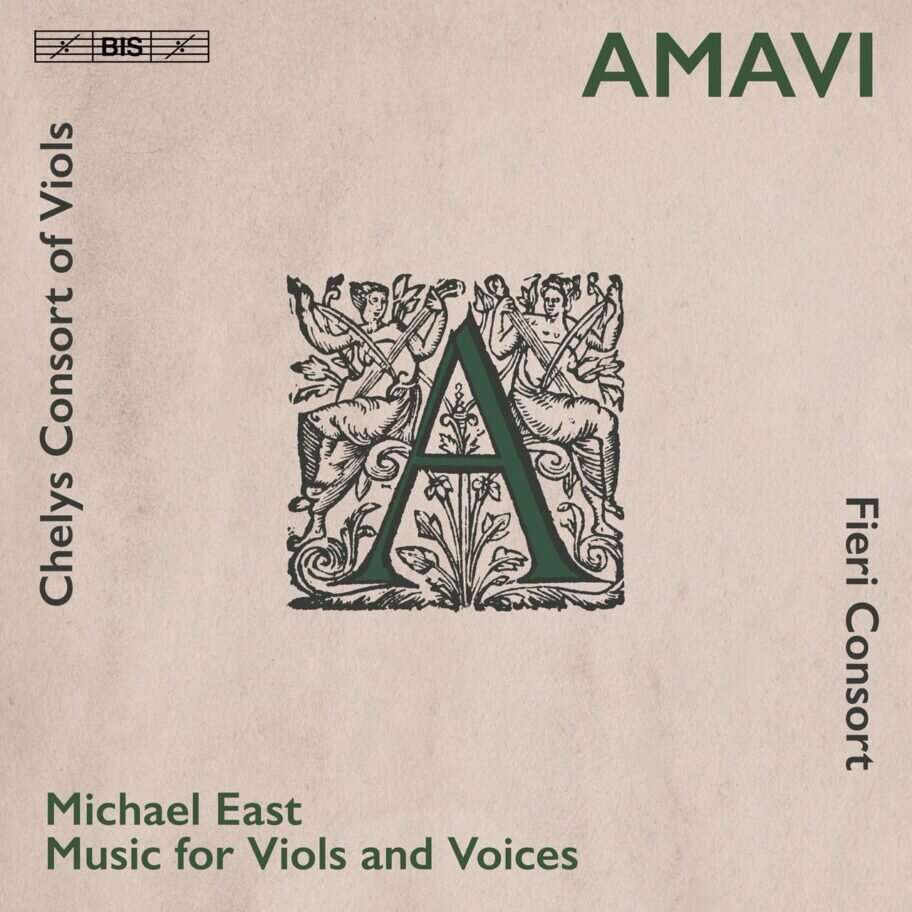 Image 1 of
Image 1 of


Amavi: Michael East – Music for Viols and Voices
Michael East (1580-1648) was an English composer and organist, working at Ely, and later Lichfield cathedrals. Seven books of his compositions were printed, making him one of the most published composers of his time, and all of them contain music for viols and voices. His eight 5-part fantasias for viols (third collection, 1610) are unusual because each has a Latin title, beginning with Desperavi, moving through Peccavi, Penitet, Triumphavi, and ending with Amavi. It seems likely that the pieces were conceived as a set, but they are rarely, if ever, performed as such. East’s fourth book was published in 1618, exactly four hundred years before the year of this recording, and it is from this book that most of our vocal items are taken.
The title page reads:
The Fourth Set of Bookes, wherein are anthemes for versus and chorus, madrigals,
and songs of other kindes, to 4. 5. and 6. parts: apt for viols and voyces
The verse anthems come from this book and have been chosen, like the other vocal items, to compliment the subject of the preceding fantasia. Other pieces are from East’s 1610 collection, and ‘Hence Starts’ comes from The Triumphs of Oriana, a collection of madrigals published by Thomas Morley in 1601 in honour of Elizabeth I, to which the leading madrigal composers of the day each contributed a piece or two.
Michael East (1580-1648) was an English composer and organist, working at Ely, and later Lichfield cathedrals. Seven books of his compositions were printed, making him one of the most published composers of his time, and all of them contain music for viols and voices. His eight 5-part fantasias for viols (third collection, 1610) are unusual because each has a Latin title, beginning with Desperavi, moving through Peccavi, Penitet, Triumphavi, and ending with Amavi. It seems likely that the pieces were conceived as a set, but they are rarely, if ever, performed as such. East’s fourth book was published in 1618, exactly four hundred years before the year of this recording, and it is from this book that most of our vocal items are taken.
The title page reads:
The Fourth Set of Bookes, wherein are anthemes for versus and chorus, madrigals,
and songs of other kindes, to 4. 5. and 6. parts: apt for viols and voyces
The verse anthems come from this book and have been chosen, like the other vocal items, to compliment the subject of the preceding fantasia. Other pieces are from East’s 1610 collection, and ‘Hence Starts’ comes from The Triumphs of Oriana, a collection of madrigals published by Thomas Morley in 1601 in honour of Elizabeth I, to which the leading madrigal composers of the day each contributed a piece or two.
Michael East (1580-1648) was an English composer and organist, working at Ely, and later Lichfield cathedrals. Seven books of his compositions were printed, making him one of the most published composers of his time, and all of them contain music for viols and voices. His eight 5-part fantasias for viols (third collection, 1610) are unusual because each has a Latin title, beginning with Desperavi, moving through Peccavi, Penitet, Triumphavi, and ending with Amavi. It seems likely that the pieces were conceived as a set, but they are rarely, if ever, performed as such. East’s fourth book was published in 1618, exactly four hundred years before the year of this recording, and it is from this book that most of our vocal items are taken.
The title page reads:
The Fourth Set of Bookes, wherein are anthemes for versus and chorus, madrigals,
and songs of other kindes, to 4. 5. and 6. parts: apt for viols and voyces
The verse anthems come from this book and have been chosen, like the other vocal items, to compliment the subject of the preceding fantasia. Other pieces are from East’s 1610 collection, and ‘Hence Starts’ comes from The Triumphs of Oriana, a collection of madrigals published by Thomas Morley in 1601 in honour of Elizabeth I, to which the leading madrigal composers of the day each contributed a piece or two.
